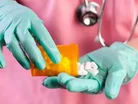Hydrocone Combinations: How Pharmacists Should Prepare for their Reclassification

The way prescriptions for hydrocone combination products (HCPs) are handled is about to change as a new rule issued by the Drug Enforcement Administration (DEA) will take effect on Oct. 6.
With the issuance of this final rule, the Administrator of the DEA rescheduled HCPs from schedule III to schedule II of the Controlled Substances Act. In doing so, it imposes the regulatory controls and administrative, civil and criminal sanctions applicable to schedule II controlled substances on individuals who handle or propose to handle HCPs, according to the Office of the Federal Register.
Several executives were concerned that because of the rescheduling, practitioners will be less likely to prescribe HCPs. The DEA responded to said concern, however, by announcing that “controlling HCPs as schedule II controlled substances should not hinder legitimate access to the medicine.”
The DEA clarified key points impacting implementation that are of interest to health care providers and patients.
1. Refills are no longer allowed for prescriptions that are written beginning Oct. 6.
Hard copy or electronic prescriptions will only be able to be issued once this day comes. eScripts can only be used if state law permits and the prescriber is certified to ePrescribe Schedule II substances, the American Medical Association notes. Pharmacies must also be certified to accept eScripts for controlled substances.
2. Prescriptions issued before Oct. 6 won’t necessarily qualify for refills.
Although the DEA rule allows for refills issued before Oct. 6 until April 8, 2015, several states have published notices that they will treat HCP prescriptions the same way they would after the rule’s implementation date, regardless if it was issued prior. Some pharmacy quality and safety processes may also not allow refills for prescriptions issued before Oct. 6, the AMA stated, adding that some health insurers may not pay for said refills.
3. Prescriptions can’t be called in or faxed.
The new rule prohibits pharmacies from filling prescriptions delivered over the phone or via fax, so written scripts will need to be issued. Emergency treatment is the only exception to this rule, which would allow physicians to call in a limited quantity of the medication to cover the emergency period only.
Pharmacies, however, are required to report prescribers to the DEA if they make such a request and do not give the pharmacy a written prescription within 7 days.
4. Allied health professionals might not be able to write prescriptions for HCPs after Oct. 6.
Check your state’s restrictions around schedule II substances to confirm whether any non-physicians members of your team who currently have prescriptive authority will be able to continue issuing prescriptions for HCPs.
5. Multiple prescriptions may be issued at one time under certain circumstances.
The rescheduling of HCPs allows a patient to receive prescriptions that would total a 90-day supply, if the prescriber has determined that it is appropriate to see the patient only once every 90 days. Written instructions that specify the earliest date a prescription may be filled must be included.
- Vaccines, Dementia & Food: The Week's Top Healthcare StoriesMedical Devices & Pharma
- Stanford: A Shingles Vaccine Could Cut Dementia Risk by 20%Medical Devices & Pharma
- Alfa Laval Hopes New Center will Help Pharma InnovationSustainability
- What Does Eli Lilly’s US$3bn Dutch Pharma Investment Mean?Procurement & Supply Chain



